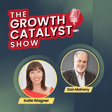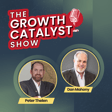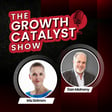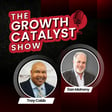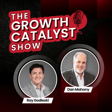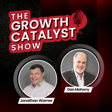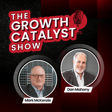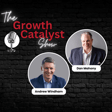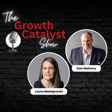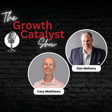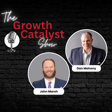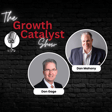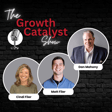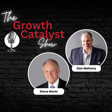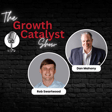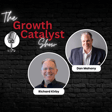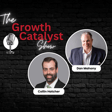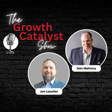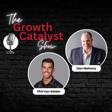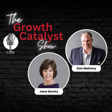Become a Creator today!Start creating today - Share your story with the world!
Start for free
00:00:00
00:00:01

Financial Empowerment: Boosting Your Business Profitability with Bill McDermott
Gain valuable insight into business growth and financial mastery with this insightful podcast episode featuring Bill McDermott, The Profitability Coach™. Bill shares expert advice on maximizing cash flow, increasing profitability, and creating a thriving business by understanding your numbers.
Transcript
Introduction to The Growth Catalyst Show
00:00:01
Speaker
Welcome to The Growth Catalyst show where we believe that growth could come in many forms, professional, personal, company, sales, you name it. I'm your host, Dan Mahoney, founder of Transcendent Sales Solutions and a guide to a world of growth possibilities. I've spent my career empowering companies and their people with strategies that accelerate growth.
00:00:19
Speaker
I'm here to bring you stories of these business leaders and their trusted advisors to gain insights into their journeys and learn how they fueled their own growth. Just maybe their journey could become part of your own growth story. Are you ready? Let's grow.
00:00:34
Speaker
Welcome to the next episode of The Growth Catalyst Show. I'm your host, Dan Mahoney, and I'm excited to have my next guest here today.
Introducing Bill McDermott, CEO of the Profitability Coach
00:00:40
Speaker
Bill McDermott is the CEO of the Profitability Coach. He identifies the challenges and opportunities for businesses and creates customized plans to maximize cash flow and increase the rate of profitability. Bill is also the podcast host of Profit Sense on the North Fulton Radio X.
00:00:58
Speaker
radio north Fulton radio acts I was right with that where he shares stories and insights from Atlanta's most successful entrepreneurs and leaders and innovators. Bill welcome to the growth catalyst show.
Bill's Early Career in Political Science
00:01:10
Speaker
Yeah thank you Dan I'm excited to be here looking forward to our visit.
00:01:16
Speaker
It's great to have you today. So I learned a lot about Bill this morning doing my research. So you started out your college career thinking about political science at Wake Forest. Were you were you thinking about it being a career politician?
00:01:35
Speaker
Now, actually, I was thinking about going to law school and becoming an attorney. We didn't have anything really but political science to pick from at Wake Forest. But then I just decided law school wasn't for me. I had been dating my high school sweetheart and I wanted to get married rather than go to law school.
00:02:06
Speaker
which probably shortened that timeframe by four to six years, I'm guessing. Yeah. And now I think the world probably has a lot of attorneys and not too many bankers and profitability coaches. So I think I made the right choice. So how did you pivot into banking and what to take it from, you know, going from political science into the banking world?
Pivot to Banking at Wachovia Bank
00:02:31
Speaker
Yeah, that's a great question. I did my interviews and the placement office suggested going into banking. It's a good background, getting a general sense of business, working with a lot of business types.
00:02:51
Speaker
I got a job at Wachovia Bank and I was actually the repo man for the auto dealer section of Wachovia Bank. This is before it was Wells Fargo. And so we probably shouldn't tell all those stories that I could tell about collecting past due car loans and repossessing cars and all that. But I do have some stories to tell there.
00:03:19
Speaker
You know, as a child, as a young kid, my dad used to sell cars part time. And there was a couple situations that I remember sharing with me. There's some wild stories, I'm sure. Oh, yeah. Yeah. Stories that involve Dobermans and baseball bats and other things. So I survived that.
00:03:43
Speaker
Yeah, you didn't do that for 32 years in banking, Bill, I'm guessing. No, we were in Kinston, North Carolina, and Kinston is a great town, tobacco town in the eastern North Carolina. But my college roommate had moved to Atlanta. He attended PA school at Emory University. He said,
00:04:05
Speaker
Bill, you and Martha ought to come to Atlanta. And I said, twist my arms. So I interviewed with some banks and ended up going to work for a bank called Peachtree Bank, which was acquired by Trust Company, which became SunTrust.
00:04:23
Speaker
and spent about 25 years of my career there, eight years in the retail side of the bank, and then about 17 years on the commercial banking side of the bank, loaning money to closely held businesses. And that's really where I started honing my financial skills and analytical skills.
Founding the Profitability Coach During the 2009 Crisis
00:04:45
Speaker
So you moved into the profitability coach based in 2009. Was that planned or was that more based on the market conditions back, you know, believe it or not now, 15 years ago? Yeah, it's hard to believe. So it was totally unplanned. I had left SunTrust. I was working in a community bank as the chief commercial lender.
00:05:09
Speaker
And the banking crisis hit earlier that fall. So it was February of 2009. And CEO walked in one day and said, Bill, you're doing a fabulous job, but we got to cut costs and you've got a big salary. And so here's your termination letter. And I went home and told my wife and she cried and I cried. And then we figured out, okay, what are we going to do next?
00:05:38
Speaker
So based on, and that happened to me too, something similar, not in a bank, but at a manufacturer, what led you from there to go into the profitability coach and pivot into that based on what you did in the banking sector? Yeah, that's a great question. So
00:06:02
Speaker
You know, when you're laid off at 54, you have no idea what you're going to do. So, you know, what do you do? You, you pray and say, okay, Lord, you've closed the door, open a window. And by the way, would you put a little neon around it with me for me so I can see it? But what I knew Dan was business owners really struggled with financial management.
00:06:26
Speaker
They didn't learn it in school and there's no on-the-job training when you're the owner of the company.
00:06:37
Speaker
So I launched the profitability coach back in the height of the great recession and said, I really want to help business owners become better financial managers. If they're better financial managers of their business, they can go from financial confusion to financial clarity. Every business owner has a really big dream for their business. They want to make it happen.
00:07:05
Speaker
But often they don't know where to start or what to do. Even further, I've found many business owners are too busy working in their business. They don't really take time to work on their business. So I launched the profitability coach actually in April, it'll be 15 years with the idea, as I mentioned, and really helping them not only grow their business, but understand what their numbers are telling them and why.
00:07:36
Speaker
So if you look now 15 years, uh, we went from the great recession to whatever we call the times we're in today, it depends on who you ask, I guess. Uh, and, and I, and I've seen a lot of clients dealing with inflation, uh, the pressures of pricing increases. And then I've seen a lot of low price alternatives now sit in the heart that, you know, hitting the market, you know, talk about from a, from a business owner perspective, how do you balance that?
00:08:06
Speaker
you know, of, you know, the inflation and, you know, and I was talking to a client the other day about, you know, not all revenue is actually good revenue. True.
Strategies for Business Differentiation and Value Proposition
00:08:16
Speaker
That's, that's an excellent point. Uh, I think first, um, most business owners don't fully understand how to differentiate themselves from their competitors. They don't fully understand what their, um, what their big,
00:08:36
Speaker
differentiator is in the marketplace. And so if you can't really articulate that, you're going to be perceived by the client as a low cost provider. And so the ability to not be a, quote, Walmart, Walmart is fantastic. You can find they have everything and pretty much they're going to have the cheapest price.
00:09:06
Speaker
But if you go into Walmart, you better know what you're looking for. And it's gonna be hard to find a parking place in the parking lot. And when you get in, you're not gonna find a customer service person.
00:09:19
Speaker
And the checkout line's gonna be really long, but it's really economical. That versus an Ace Hardware, we've got a great Ace Hardware close by. You walk in, you're gonna get greeted by someone and they'll ask you what you're looking for. They're gonna take you exactly to the row where it's on. They're gonna tell you the pros and cons of the three or four different products that you might be shopping for.
00:09:46
Speaker
And just the expertise, the service is totally different than what you experience at a Walmart. So I think how you deal with
00:09:59
Speaker
as a business owner is you have to understand your value proposition. Uh, that allows you to differentiate yourself. Uh, because if you can, then you're willing to charge a price based on the value that you're delivering, which will help in the long run offset some of the inflationary pressures. Because when I go to my ACE hardware,
00:10:25
Speaker
I'm just looking to find the thing that I need. And maybe I should be, but I'm not really focused on how much it costs versus the other two things. So I think business owners, in order to not only combat inflation, but also deal with price pressures,
00:10:46
Speaker
I think all of us should focus on what's our value that we're delivering to the marketplace and price accordingly. And hopefully that will, over time, beat inflation. Let's take a moment for a quick word from our sponsor.
00:11:00
Speaker
This episode of the Growth Catalyst Show was brought to you by Transcendent Sales Solutions. Whether your company is facing uncertainty, declining sales, or resource limitations, Transcendent Sales has the solution. Their team has decades of experience helping businesses find alignment to meet their growth goals and transforming underperforming sales organizations into revenue producing market leaders.
00:11:21
Speaker
They take a hands-on, results-oriented approach to solving sales challenges. Visit TranscendenceSales.com to learn more and subscribe to the biweekly Growth Catalyst newsletter for insightful growth strategies. Transcendence Sales Solutions, empowering businesses to reach new heights. And now, back to the show.
00:11:40
Speaker
So it sounds like what you're doing in the profitability coach is not necessarily all just about numbers and crunchy numbers. You're taking it a lot further on how those numbers are affected. Yeah. And so a story comes to mind. Well, let me back up before the story.
00:11:59
Speaker
businesses are
Five Key Factors: People, Processes, Marketing, Execution, Cash Flow
00:12:00
Speaker
either doing really well, Dan, or not doing really well based on five things. Those five things are people. To use Jim Collins's quote, you got to have the right people and have them in the right seats. You got to have processes documented, otherwise you're really inefficient. You've got to have a good marketing strategy.
00:12:23
Speaker
You have to execute well, both efficiently and effectively. And then the fourth thing is you got to have enough cash. Cash is like oxygen to a business. And there are a lot of business out there that are figuratively suffocating because cash flow is so fast, is so sparse. Cash is king. Yeah, indeed. So generally, the profitability coach
00:12:49
Speaker
First, does a financial assessment of the business. We typically look at three years worth of financials. We are looking at trends and the positive or negative trends are usually happening or not happening because of those five things, people, process, strategy, execution, and cash. And so we're looking for areas to accelerate financial growth and get that business owner
00:13:18
Speaker
moving along the road to profitability. So I can think of a psychology practice that I worked with probably six or seven years ago. It's a good practice, three locations, very successful, but they're receivables.
00:13:36
Speaker
We're all from insurance companies and insurance companies are notoriously slow pay. So the first thing we had to do is speed up her cash flow, which we did. We focused on the receivables that were over 60 days and over 90 days, basically doubled her cash balance by getting more money in the bank. And then we really focused on her scheduling.
00:14:01
Speaker
because she had in those three locations, she had 27 therapists and psychologists. And so we were working on getting appointments scheduled and made. And so in about a two year period, we were able to increase her top line revenue by about 60%, about 30% a year consecutively for two years.
00:14:28
Speaker
So the combination of that plus having extra cash in the bank, she was able to almost double her profitability in two years just because of the increased revenue growth that we had and of course had more cash to fund that growth because we had improved collections. And that's just one of many stories.
00:14:51
Speaker
I'm sure you have dozens of them you can share. Um, if we look at the market today, interest rates have gone up pretty high and I'm, and I know even myself with my business, I wasn't worried about taking out money before four or five years ago because it was cheap money versus now you really have to look at it. So how are businesses really managing that with lines of credit and you know, where the, it is very expensive now to have, to have debt.
00:15:19
Speaker
Yeah. First, I believe if you don't need a line of credit, that's probably the best time to get one. And so it is more expensive.
00:15:32
Speaker
But I think 85% of business owners losing sleep at night is over cashflow, Dan. And so even if you don't need a line of credit, it makes sense to have one because if you've got payroll coming and all of a sudden the receivables you were hoping would come in aren't coming in, it's a great idea to have that line of credit.
00:15:57
Speaker
I will also tell you I've got another client who despite increased interest rates has made some pretty significant capital investments, primarily because these capital investments, even in a rising rate environment,
00:16:14
Speaker
are going to give him the ability to expand, the ability to grow a different product line than what they have been in the past, as well as a machine that takes five different processes and converts it into one. So it's much more efficient.
00:16:36
Speaker
And even the rising interest cost in that case is more than offset as far as the benefit and the ability to improve the efficiency of the operation as well as expand so that they can grow even more than they've been growing.
00:16:54
Speaker
So as we talked a little bit before who you, it depends who you ask, what we are in the state of this, uh, this business environment right now with, with a lot of the inflationary things, just looking at it. Cause things I think have slowed down just a tad. What are some things some business owner owners should be doing right now to really, and I'll say the R word recession proof their business. Yeah. Uh,
00:17:22
Speaker
I've been through, I think, seven recessions in my career, maybe. So some of them are more difficult than others. But I think the first thing I would say is, to the extent that you can, when the economy is feeding you lemons, make lemonade.
00:17:43
Speaker
There's got to be something that you can do to pivot your business. For example, restaurants all of a sudden adopted curbside pickup during COVID. And so people were tired of cooking for themselves. I know my wife and I were tired for cooking for ourselves. So you could go to a restaurant, not sit inside, but basically get a takeout order curbside.
00:18:11
Speaker
So, lemons to lemonade. When you're in a recession, honestly, you've got to pay attention to your numbers.
Financial Management and Crisis Advice
00:18:22
Speaker
And so, the next thing I would say is check your numbers. If you see revenue going down, that's typically going to mean you're going to have decreased profitability.
00:18:35
Speaker
understand where you can cut in a recession if you can cut some non-revenue generating activities. That is probably the second thing I would look at. So in addition to reducing cost, what are things that you can do to increase your cash flow?
00:18:58
Speaker
The big thing is, is, is your payables or somebody else's receivables and your receivables or somebody else's payables. So what can you do to try to collect your receivables faster and hopefully maybe pay your payables a little bit slower. That certainly helps with cashflow. Um, the other thing as a former banker,
00:19:23
Speaker
About eight out of every 10 business owners I talked to have a bank, but not a banker. And listen, it's hard to have a banker because bankers move around a lot. And so, but I would say if you have a banker that you have a relationship with, uh, that can help you during times of a recession in a proactive way.
00:19:46
Speaker
That's invaluable. Then the other thing I would say in recessions, be familiar with some special terms. If your bank all of a sudden is transferring you to something called the Special Assets Department, SAD, you're going to be sad when you get there because that department in a bank,
00:20:12
Speaker
is charged with managing the high-risk credits out. Also, be aware of terms like covenant default. You may have signed a commitment letter and you forgot that you had a cash flow covenant in there, which means you've got to have a certain amount of profit to cover your loan payments. If you break that,
00:20:33
Speaker
there's a possibility the bank will come to the table and either renegotiate, there are even some circumstances where that covenant default goes into something called a forbearance agreement. So that's another thing to look at. If the bank is asking you to sign a forbearance agreement, technically they have called the loan
00:20:56
Speaker
but they're going to defer or forebear the liquidation of the assets by signing this agreement. And that agreement usually means higher interest rate, stricter terms, et cetera.
00:21:11
Speaker
So even if you're making the payments, they could do that. Even if your profitability is down, hence why they probably ask, they get their financials every year. Yeah. Uh, because if your profit is down, that's going to signal that at some point in time, if you're continuing to put capital into the business, the owner's going to run out. And if the business can't produce the cashflow, uh, you're going to have a hard time paying the bank. Got it.
00:21:39
Speaker
Well, those are really good tips, Bill.
Profit Sense Podcast and Entrepreneurial Insights
00:21:42
Speaker
I wanted to ask you before, this has been a great conversation, talk a little bit about your podcast, The Profit Sense. I've been blessed to be a guest on the show. Tell us a little bit about it and what you're doing on the show with Business Radio X. Yeah, thank you. And by the way, you were a great guest on the show because I think, Dan, what I think you do is so invaluable.
00:22:08
Speaker
I remember when you came on just talking about different strategies of how businesses grow and expand their sales team. That was some good information. But Profit Sense was born out of the idea that there are many people just like me who are fed up with corporate America. They're laid off and they want to become entrepreneurs.
00:22:35
Speaker
I was going to be a career banker, but I think there was some divine plan where I had to get laid off to get pointed in the right direction. So profit sense exists as a way to encourage
00:22:53
Speaker
individuals who are thinking about entrepreneurship to do that. The other thing is, profit sense also exists to hear
00:23:07
Speaker
stories of how business owners have struggled but also achieved. I was listening to a podcast on NPR by Guy Raz and he said he has a podcast called How I Built This and interviews business owners about how they built businesses.
00:23:31
Speaker
It is great to hear some of the business owners' stories, including yours, about how we all decided to get out of corporate America, start our own businesses, the struggles that we've had, the achievements that we've had, but also the light bulb moments that we've had when we're working with clients and the light bulb goes off in their head.
00:23:57
Speaker
And we realized, gosh, there was something that we said or did that made a difference in someone else's life.
00:24:07
Speaker
My grandfather was a huge storyteller. And I think I kind of have that storyteller gene too. So we tell stories of business owners as inspiration to people in corporate America thinking about going into business, as well as hearing encouraging stories of successful business owners and the professionals that advise them.
00:24:33
Speaker
Well, Bill, you do a great job on the show and there's so many of us entrepreneurs out there. I like to call us, we should start a club, the Corporate Refugee Club. That's right. I couldn't agree. I would be willing to join if you started.
00:24:49
Speaker
We're going to be, we're going to start up as maybe charter members and get something going. Bill, this has been a great conversation. If someone's interested in learning more about the profitability coach and listening and learning about your podcast, the profit sense, tell them where they can go and find.
Contact Information for Profitability Coach and Podcast
00:25:08
Speaker
Yeah, probably the best way for the profitability coach is go to profitability coach.net. That's our website. If they want to email me, they can bill at the profitability coach.net.
00:25:26
Speaker
They can go to our podcast show page at Profit Sense, and that's S-E-N-S-E, ProfitSenseRadio.com. If someone wants to call me on the phone, they can do that at 770-597-3136. Bill, I really appreciate you taking some time today to speak to us, and thank you for appearing on The Growth Catalyst Show. Yeah, thanks for having me. I had a great time.
00:25:55
Speaker
And that's a wrap for today's episode of The Growth Catalyst Show. Remember, you can take these stories of growth and make them part of your own journey. Learn from them, draw inspiration, and let them guide your path of growth. I'm your host, Dan Mahoney, and I look forward to our next journey together. If you've enjoyed the show, please subscribe and leave a review. Until next time, keep growing.
